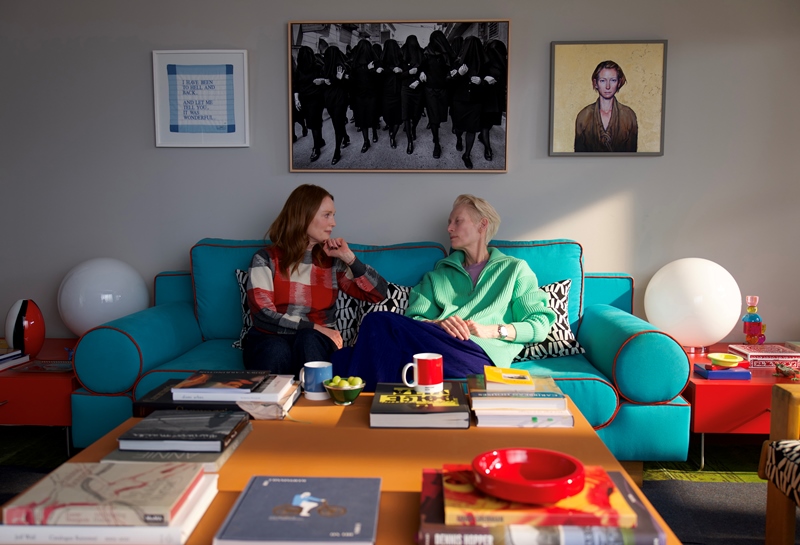Review: ‘The Room Next Door’ holds back too much

A scene from ‘The Room Next Door’ courtesy of Sony Pictures Classics
‘The Room Next Door’ is a reserved account of a terminally ill woman’s final days before she opts to end her life.
“Death comes for us all” sounds rather ominous and kind of discouraging. But in actuality, it’s just a fact. Science has not yet found a way for humankind to cheat death. People can now expect to live longer than ever before for countless reasons that include lifestyle and advancements in medicine. However, not all treatments afford the afflicted a quality of life they are willing to accept, so some people may exercise their right to forego certain avenues of care in favour of living as they choose for however long that may be. In The Room Next Door, a terminally ill woman asks a friend to be there for her final days.
Martha (Tilda Swinton) was a war correspondent, travelling the world and bearing witness to some of its greatest atrocities. Having faced death countless times over the course of her career, she may have been better equipped to address her terminal cancer diagnosis than most. Friends and family come by to pay their respects, but Ingrid (Julianne Moore) really tries to remedy their estrangement with frequent visits and any help she can provide. With her health not improving, Martha decides she’d like to end her life before experiencing the imminent suffering that would proceed her natural death. She asks Ingrid to accompany her on one last getaway to a beautiful vacation house in upstate New York.
This is award-winning filmmaker Pedro Almodóvar’s first English-language picture. The subject is provocative as it explores suicide, euthanasia, the act of complicity and the right to refuse medical care. It also addresses the concept of a “good death” and what that means to Martha when faced with the looming loss of her quality of life. Swinton and Moore adeptly explore these topics with measured restraint, which is not to say they don’t display any emotion, but that they feel like real people dealing with circumstances beyond their control. Martha hides the pain that exceeds her medication, while Ingrid is forced to confront her fear of death to support her friend.
Yet, in spite of their capable performances, the film’s most notable shortcoming is that it lacks the passion that exudes from Almodóvar’s previous pictures. He’s generally done an excellent job of portraying women in difficult situations, which have gratefully not always revolved around a man or romantic relationship. These films take audiences on an emotional journey that is felt deeply on and off screen — it’s one of the director’s signatures. But notwithstanding this movie’s touching outline, it fails to arouse the effective feelings viewers have come to expect from an Almodóvar movie. It does, however, still make striking use of colour, particularly red, green and blue.
It also feels as if the narrative is missing some discourse on medical assistance in dying, which is lawfully offered in several countries. Instead, Martha must clandestinely acquire the drug and plan to help Ingrid avoid prosecution after her demise. Yet, there’s never any discussion about why such measures are required or what options would be available if she lived elsewhere. While there’s clearly an effort to avoid certain political debates (though it does raise a theological argument), it’s a noticeable omission for two educated, worldly characters not afraid to question or defy authority.
Director: Pedro Almodóvar
Starring: Julianne Moore, Tilda Swinton and John Turturro
Review: ‘The Room Next Door’ holds back too much
#Review #Room #Door #holds





